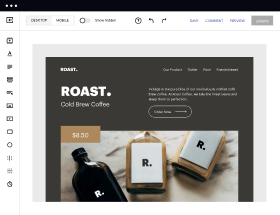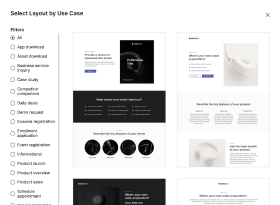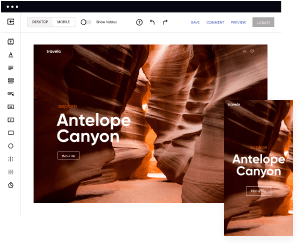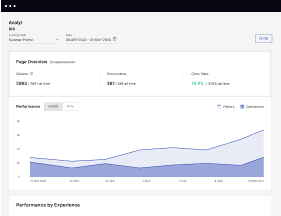Utilize Instapage's template optimized for All-in-one desktop and simplify your reset password page creation workflow
Design using a responsive reset password page template that delivers a flawless experience on All-in-one desktop. Try Instapage today!

Easy to build without coding
With the intuitive drag-and-drop builder, anyone on your team can create high-converting pages without any knowledge of code or design. Make enhancements to your landing page with custom widgets using Javascript, HTML/CSS, or third-party scripts.
Multiple layouts for any industry and goal
Select from 500+ landing page layouts built to boost conversions across industry-specific scenarios. Customize them by adjusting fonts, adding images, and generating on-brand content with the AI assistant. Quickly scale with Instablocks® and Global Blocks that you can save, reuse, and update globally.
Loads fast and looks polished on any device
Every template is responsive, which means they present professionally on any device and load blazingly fast with our Thor Render Engine. You can also power them up with Google AMP technology to deliver an unparalleled mobile experience and drive higher conversions.
Robust analytics & experimentation
Get real-time updates and reporting across all your devices, showing the number of visitors, conversions, cost-per-visitor, and cost-per-lead. Launch AI-powered experiments, run A/B tests, and use heatmaps to analyze user behavior, then optimize your landing page to maximize conversions.
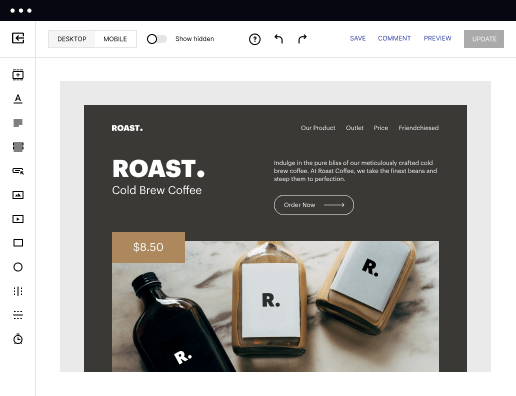
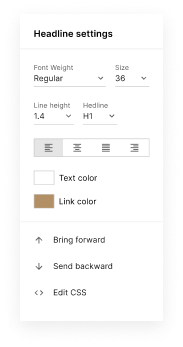
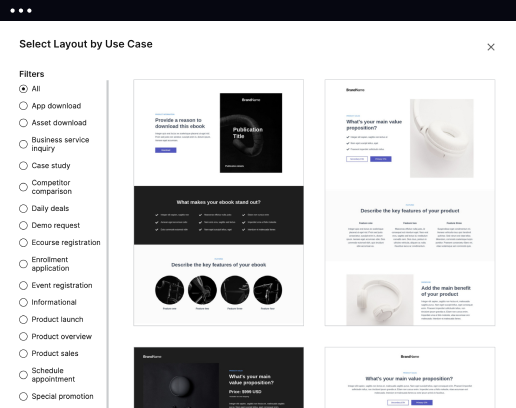
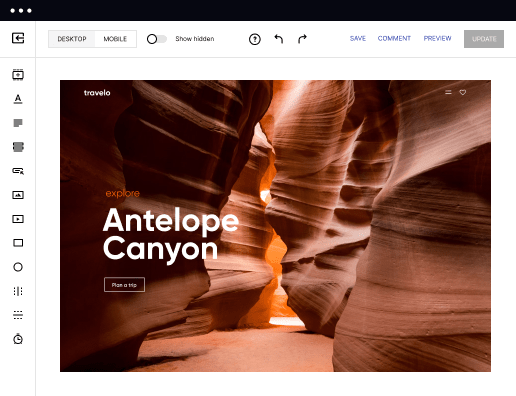

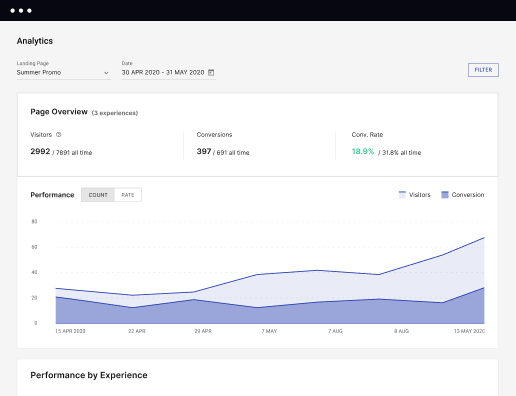
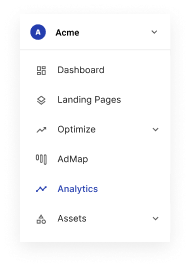
Easy to build without coding
With the intuitive drag-and-drop builder, anyone on your team can create high-converting pages without any knowledge of code or design. Make enhancements to your landing page with custom widgets using Javascript, HTML/CSS, or third-party scripts.
Multiple layouts for any industry and goal
Select from 500+ landing page layouts built to boost conversions across industry-specific scenarios. Customize them by adjusting fonts, adding images, and generating on-brand content with the AI assistant. Quickly scale with Instablocks® and Global Blocks that you can save, reuse, and update globally.
Loads fast and looks polished on any device
Every template is responsive, which means they present professionally on any device and load blazingly fast with our Thor Render Engine. You can also power them up with Google AMP technology to deliver an unparalleled mobile experience and drive higher conversions.
Robust analytics & experimentation
Get real-time updates and reporting across all your devices, showing the number of visitors, conversions, cost-per-visitor, and cost-per-lead. Launch AI-powered experiments, run A/B tests, and use heatmaps to analyze user behavior, then optimize your landing page to maximize conversions.
All the features you need to build lead-generating landing pages
Explore more featuresLearn how to build top-performing landing pages for any goal
FAQs
Leading the way in building high-performing landing pages





An all-in-one guide to utilizing Instapage for optimizing your landing pages
Landing pages are crucial for maximizing conversions in any marketing strategy, and Instapage stands out as a powerful tool for creating and optimizing them. With features tailored for various industries—such as tech, education, and financial services—marketers can effectively enhance their digital campaigns to realize their maximum ROI. This guide will walk you through the essential steps for crafting optimized landing pages using Instapage, ensuring that you not only capture leads but also convert them efficiently.
Choosing the right templates
Instapage offers over 100 ready-made templates that are designed for high conversion rates. Selecting the right template is the first step toward creating an effective landing page that resonates with your target audience. Consider the following points when choosing a template:
- Identify your campaign goal: Choose a template that aligns with your specific conversion goals, whether it's lead generation, sales, or event sign-ups.
- Consider your audience's preferences: Select designs that reflect the aesthetics and functionalities your audience would find appealing.
- Ensure mobile compatibility: With a growing number of users accessing websites via mobile, ensure that the template is responsive and performs well on different devices.
Personalizing your landing page
Personalization can significantly improve the effectiveness of your landing pages. Using Instapage, implement features that dynamically alter text and visuals based on visitor data. This method enhances user experience and increases conversion rates.
- Dynamic text replacement: Modify specific words or phrases based on the source of the traffic or user behavior.
- AdMaps: Align your ads with specific landing pages to ensure that visitors find a consistent message and experience between ads and landing pages.
- Audience-level tracking: Utilize analytics to track how different audience segments interact with your landing pages for continuous improvement.
Optimizing for conversions
Optimization doesn’t stop after launching your landing page. Instapage provides built-in tools such as A/B testing and heatmaps, allowing you to assess and enhance performance over time. Focus on the following optimization strategies:
- Conduct A/B tests regularly: Compare different versions of your landing pages to identify which elements drive more conversions.
- Analyze heatmaps: Use heatmaps to visualize where visitors are clicking and scrolling, guiding you to make data-driven adjustments.
- Review analytics dashboards: Regularly review metrics such as bounce rates and conversion rates to identify areas for improvement.
When executed correctly, these steps will help marketers leverage Instapage's robust capabilities to build high-performing landing pages that drive results.
Ready to transform your marketing strategy? Start using Instapage today to maximize your campaign performance and ROI.
Reset password page template optimized for all-in-one desktop
Understanding the importance of a well-designed reset password page
A well-designed reset password page is crucial in enhancing user experience within web applications. Users should be able to navigate the process with ease and confidence, as password failures often lead to frustration and abandonment. An intuitive reset password experience is a pivotal aspect of user retention, ultimately affecting a brand’s overall credibility and trustworthiness.
The user experience necessity extends beyond mere aesthetics; it involves clear guidance throughout the process. If users find the reset procedure convoluted, they are likely to leave the application altogether, impacting business turnover and brand loyalty. Therefore, ensuring that users encounter a well-structured reset password page can significantly enhance retention rates.
Statistics and user behavior
Data suggest that approximately 30% of users will attempt to reset their password at least once in a given year. Given this staggering statistic, understanding user behavior regarding password resets is essential. Users expect a seamless and quick recovery process where they can regain access without unnecessary hurdles. Research indicates that a positive reset experience increases the likelihood of users returning, highlighting the importance of an effective design.
30% of users will attempt to reset their password yearly.
Positive reset experiences drive higher user retention.
A confusing reset process leads to user abandonment.
Key elements of a reset password page template
The essential features in a reset password page template contribute significantly to completing the task efficiently. Clear, concise text instructions help eliminate ambiguity for users. Additionally, visual indicators, such as outlined input fields, guide users effortlessly through the form completion process. Inline validations can provide immediate feedback, reducing errors and enhancing user confidence.
Clear and concise text instructions for user guidance.
Visual indications of input fields to enhance usability.
Inline validation for email inputs for immediate feedback.
Accessibility features to cater to diverse user demographics.
Form design principles
When creating a reset password page, mobile responsiveness is paramount. Users will interact with forms across various devices, so ensuring the template maintains functionality on all screens is vital. A simplified layout contributes to enhanced usability and reduces cognitive load, allowing users to focus solely on the task. Furthermore, strategic element placement enhances the user flow, leading to more successful user interactions.
The importance of a coherent visual hierarchy cannot be overstated. The layout and color scheme should direct users’ attention intuitively and guide them through the process. Optimal typography for readability can also bolster engagement, leading to better retention rates and user satisfaction.
The role of JavaScript in enhancing functionality
JavaScript can significantly enhance the functionality of a reset password page template. By incorporating dynamic elements, developers can implement real-time form validation, ensuring users receive feedback as they fill out fields. This prevents errors before they occur, creating a smoother experience overall. Furthermore, JavaScript can provide immediate response messages for successes or errors, allowing users to know the status of their actions promptly.
Browser compatibility is another crucial aspect of using JavaScript effectively. Since users may employ various web browsers like Chrome, Firefox, Safari, and Edge, ensuring that scripts run consistently across these platforms guarantees a cohesive user experience. This adaptability minimizes confusion and improves overall satisfaction with the password recovery process.
Crafting effective input fields
Designing user-friendly input types is critical for a reset password page. Email input fields require best practices for capturing user information - clear placeholders, informative labels, and validation rules. For password fields, it is essential to encourage secure password entry while maintaining an understanding tone, hinting at complexity without overwhelming the user.
Moreover, taking advantage of browser functionalities can streamline the user experience. Autofill features can save users time when filling out forms, while security measures must be in place to protect sensitive information. This balance between convenience and security is key to creating a successful reset password experience.
Creating intuitive user journeys
Mapping out user scenarios highlights the typical flow from signing in to resetting the password. A well-crafted user journey identifies potential roadblocks, such as confusing language or unclear instructions, and addresses them proactively. Anticipating user needs helps streamline the path towards password recovery.
Identify typical user flows to enhance their journey.
Address potential roadblocks like confusing language.
Utilize layout and color schemes to guide users effectively.
A coherent visual hierarchy assists in guiding users through the reset process. A well-considered color scheme can attract attention to necessary elements while appropriate typography enhances readability, helping to maintain user focus on form completion.
Leveraging HTML forms for data collection
The form structure is crucial for efficiency in a reset password page. A well-structured form includes all necessary components for a successful reset while also ensuring that users feel secure in their interactions. Potential inclusions of elements like CAPTCHA can help verify a user's identity, adding an extra layer of security during the password reset process.
Error handling mechanisms are essential for guiding users when mistakes occur. Best practices for displaying error messages include clear, non-threatening language that guides users to correct their mistakes. Additionally, interactive elements can prompt users towards successful completion, thus enhancing their overall experience and satisfaction with the platform.
Content strategy for effective text elements
Crafting clear and actionable text plays a significant role in guiding users through a reset password page. Employing user-centric language in instructional elements helps convey clarity, while straightforward call-to-action phrases encourage timely responses from users. The text should reflect empathy as users navigate the reset process, alleviating any tension that may arise.
Use user-centric language for instructional text.
Implement call-to-action phrases that prompt timely responses.
Incorporate empathetic messaging to relieve frustration.
Microcopy can create supportive text that enhances user satisfaction. Short, reassuring prompts during interactions can help users feel more at ease during the password reset process. The impact of concise, encouraging messaging should not be underestimated, as it plays a vital role in user experience.
Achieving consistent branding across platforms
Incorporating brand elements into the reset password page template solidifies brand identity across user interactions. Features like logos, color schemes, and design motifs should be integrated to maintain a coherent aesthetic. This consistency helps reinforce brand trust and credibility, ensuring users recognize your platform instantly.
Customizing the reset password template for different web environments is essential. Designers must adapt the template based on the overall site theme while ensuring compatibility with various CMS platforms. Such customization ensures a seamless experience across unique user interfaces, contributing to overall user satisfaction.
Measuring success and performance metrics
To gauge the effectiveness of a reset password page, key performance indicators (KPIs) are essential. Metrics such as user engagement, drop-off rates, and successful visit completions can provide valuable insights into design effectiveness. Conducting A/B testing on different design and messaging elements can help optimize user experiences over time.
User engagement metrics help evaluate interaction success.
Identify drop-off rates to understand potential issues.
Utilize A/B testing for design and messaging optimization.
Employing analytics tools to track user interactions on the reset password page can yield critical insights for continued improvement. Interpreting data allows teams to recognize trends, refine design strategies, and ensure the reset process meets evolving user needs effectively.
Future trends in reset password page design
Emerging innovations in security and usability continue to reshape the landscape of authentication methods. Observing shifts towards biometrics could provide users with more convenient and secure password recovery options, enhancing their experiences. Furthermore, the integration of artificial intelligence in the process can facilitate smoother and more personalized recovery experiences for users.
Potential biometrics shifts could enhance user convenience.
Integrating AI for personalized user experiences.
New security measures will necessitate adaptive design practices.
Additionally, the push towards greater accessibility should remain a focus for future designs. Meeting evolving standards for inclusivity will enable a broader user spectrum to engage with applications effectively. Understanding the diverse needs of users and implementing inclusive design practices will be paramount for fostering a positive environment for all.
Ready to skyrocket conversions?
Supercharge your ad campaigns with high-performing landing pages
Get started



